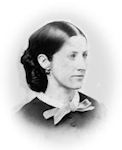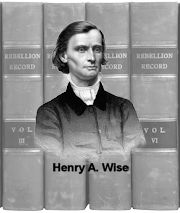March 15.—This day a reconnoitring party started from the north side of Quantico Creek, and occupied Dumfries, Va. From the river to the village the road was strewn with dead horses. Some were in harness attached to wagons. The rebel force in and around Dumfries was composed of Texans, Alabamians, South-Carolinians, under the command of Wigfall, of Texas. About thirty cartridge and cap-boxes, some blankets, flour, etc., were found in the house used as Wigfall’s headquarters. A large quantity of shells and cartridges were also stowed away in a barn, and seventy-five boxes of ammunition were found near the creek.—N. Y. Commercial, March 17.
—The United States frigate Cumberland, which was sunk by the attack of the Merrimac, rebel steamer, still keeps her masts above water, and the Stars and Stripes are yet flying at her masthead.
—A Naval expedition, composed of the gunboats Benton, Louisville, Cincinnati, Carondelet and Conestoga, under Flag-Officer Foote, left Cairo, Ill., at seven o’clock this morning.
At Columbus they were joined by the Pittsburgh, St Louis and Mound City, and were overtaken by eight mortar-boats, in tow of four steamers, with transports and ordnance-boats. They arrived at Hickman, Ky., at half-past four o’clock this afternoon.
The mounted pickets of the enemy were in sight on the bluff, when two companies of the Twenty-seventh Illinois regiment were sent after them, but they escaped.—N. Y. Herald, March 10.
—Early yesterday morning the Island Belle entered Aquia Creek, Va., near the pier and commenced shelling the battery on the hill, the battery on the water – line having been abandoned. The fire was returned from the hill-battery. No harm was done to the Island Belle, save the carrying away of a piece of joiner’s work from the engine-room by a fragment of a shell. Later in the day the Anacostia and the Yankee shelled the field-battery at Boyd’s Hole, and, after a lively interchange of iron compliments, which did no harm to the vessels, they both retired.
The steamer Yankee visited the Navy-Yard at Washington, took on board a quantity of shell, and to-day, with the Anacostia, she proceeded to shell the rebel batteries at Aquia Creek. The enemy replied briskly with their guns, but failed to reach the Yankee, although they made several excellent line-shots. One shell struck but a short distance from the Yankee, in direct range with her wheel-house. Most of the shots were too high for the Anacostia, many of them passing over to a great distance. The heavy guns of the Yankee enabled her to lie off out of range, and drop her shells with precision into the batteries. After firing some time the Yankee and Anacostia hauled off, without being struck.
—Gen. Lew. Wallace’s division went to Purdy, McNair County, Tenn., burned the bridge, and took up the track, on the railroad leading from Humboldt to Corinth, Miss., cutting off a train heavily laden with troops, which arrived while the bridge was burning. — N. Y. World, March 17.

 Meanwhile it worries me all the time to be leading this thoroughly useless life abroad while you are acting such grand parts at home. You would be astonished at the change of opinion which has taken place here already. Even the Times only this morning says: “The very idea of such a war is American, multitudinous, vast, and as much an appeal to the imagination as the actual brunt of arms.” And again in speaking of the tone of the Southern papers it says in a striking way: “Some of their expressions recall those in which the Roman historians of the later Empire spoke of the Northern tribes.” The truth is, as our swarm of armies strike deeper and deeper into the South, the contest is beginning to take to Europeans proportions of grandeur and perfection like nothing of which they ever heard or read. They call us insane to attempt what, when achieved, they are almost afraid to appreciate. A few brilliant victories, a short campaign of ten days or a fortnight, rivalling in its vigor and results those of Napoleon, has positively startled this country into utter confusion. It reminds me of my old host in Dresden, who, when he heard of the battle of Magenta, rushed into my room, newspaper in hand, and began measuring on the map the distance from the Ticino to Vienna. The English on hearing of Fort Donnelson and the fall of Nashville, seem to think our dozen armies are already over the St. Lawrence and at the gates of Quebec. They don’t conceal their apprehensions and if we go on in this way, they will be as humiliated as the South itself. The talk of intervention, only two months ago so loud as to take a semiofficial tone, is now out of the minds of everyone. I heard Gregory make his long-expected speech in the House of Commons, and it was listened to as you would listen to a funeral eulogy. His attacks on us, on Seward and on our blockade were cheered with just enough energy to show the animus that existed in a large proportion of the members, but his motion, a simple and harmless request for papers, was tossed aside without a division. I saw our friend Mason on the opposite side of the House to where I was sitting with Thurlow Weed. He is unlucky. One of the Bishops who happened to have come in and was seated near the door, heard a “Hear! hear!” behind him, and looking round saw Mason. For a stranger to cheer is a breach of privilege, and the story went all over town creating quite a row. Mr. Mason now denies it, I am told, and says it was some one else who cheered. He maintains now that the South always expected to lose the border States and that now that they are retiring to the cotton region the war has just begun. He coolly talks this stuff to the English people as if they had n’t always asserted that the border States were a vital point with them. We on the other hand, no longer descend to argue such stories, or to answer the new class of lies; but smile blandly and compassionately on those who swallow them and remark that so far as advised, the nation whom we have the honor to represent is satisfied with the progress thus far made, and sees no reason to doubt that the Union will be maintained in its fullest and most comprehensive meaning.
Meanwhile it worries me all the time to be leading this thoroughly useless life abroad while you are acting such grand parts at home. You would be astonished at the change of opinion which has taken place here already. Even the Times only this morning says: “The very idea of such a war is American, multitudinous, vast, and as much an appeal to the imagination as the actual brunt of arms.” And again in speaking of the tone of the Southern papers it says in a striking way: “Some of their expressions recall those in which the Roman historians of the later Empire spoke of the Northern tribes.” The truth is, as our swarm of armies strike deeper and deeper into the South, the contest is beginning to take to Europeans proportions of grandeur and perfection like nothing of which they ever heard or read. They call us insane to attempt what, when achieved, they are almost afraid to appreciate. A few brilliant victories, a short campaign of ten days or a fortnight, rivalling in its vigor and results those of Napoleon, has positively startled this country into utter confusion. It reminds me of my old host in Dresden, who, when he heard of the battle of Magenta, rushed into my room, newspaper in hand, and began measuring on the map the distance from the Ticino to Vienna. The English on hearing of Fort Donnelson and the fall of Nashville, seem to think our dozen armies are already over the St. Lawrence and at the gates of Quebec. They don’t conceal their apprehensions and if we go on in this way, they will be as humiliated as the South itself. The talk of intervention, only two months ago so loud as to take a semiofficial tone, is now out of the minds of everyone. I heard Gregory make his long-expected speech in the House of Commons, and it was listened to as you would listen to a funeral eulogy. His attacks on us, on Seward and on our blockade were cheered with just enough energy to show the animus that existed in a large proportion of the members, but his motion, a simple and harmless request for papers, was tossed aside without a division. I saw our friend Mason on the opposite side of the House to where I was sitting with Thurlow Weed. He is unlucky. One of the Bishops who happened to have come in and was seated near the door, heard a “Hear! hear!” behind him, and looking round saw Mason. For a stranger to cheer is a breach of privilege, and the story went all over town creating quite a row. Mr. Mason now denies it, I am told, and says it was some one else who cheered. He maintains now that the South always expected to lose the border States and that now that they are retiring to the cotton region the war has just begun. He coolly talks this stuff to the English people as if they had n’t always asserted that the border States were a vital point with them. We on the other hand, no longer descend to argue such stories, or to answer the new class of lies; but smile blandly and compassionately on those who swallow them and remark that so far as advised, the nation whom we have the honor to represent is satisfied with the progress thus far made, and sees no reason to doubt that the Union will be maintained in its fullest and most comprehensive meaning.




